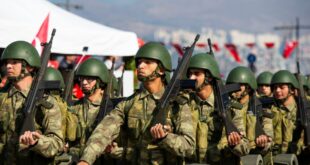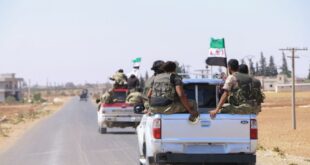It is assumed in many European capitals that Moscow is more focused on the outcome of the proposed transitional process in Syria than it is on the future of Assad. This sounds logical. Mr. Putin said several times that what is important is to prevent the collapse of the State and preserve stability in Syria. Yet, examining this assumption thoroughly would reveal some important questions.
The main question here is related to the fluid nature of any definition of “the outcome of the Syrian transitional process” and the extent to which it may really contribute to future stability in Syria.
First, the fluid nature of the process appeared early on when a dispute emerged about “defining” terrorist groups in the Syrian opposition. While this dispute appears “technical” in the view of some observers, it is in fact more significant in terms of what it really reveals.
Shaping the parameters of the transitional process means shaping the outcome of this process. Therefore, it is actually the end that explains the nature of the road that reaches it. Talks about the nature of the transitional process must be designed to produce an outcome that focuses mainly on a sustainable stability. This, in its turn, means cleaning Syria of terrorist groups, building an inclusive state structure, ending the previous state of affairs that led to the wide popular revolt of 2011 and respecting basic human and political rights.
Secretary Kerry and Foreign Minister Lavrov used the term “secular” to define the sought after future Syria. We believe that term is deceptive and too general to mean anything in the current Syrian context. Furthermore, it gives the parties involved in the process, particularly Russia, a larger than usual space to create all kinds of obstacles and employ blunt pressure tactics.
Due to historical reasons that are too complex to discuss now, the civil war in Syria has fallen, as is always the case in the Middle East, to default levels defined by religions and sects. We cannot think of any political force, not only in Syria but in the whole Middle East, which is truly secular. Now, how are you going to build a future secular Syria without secularists?
Second, this question becomes more relevant in the context of the current debate about “who is a terrorist? And “who is a secular?”
In the case of the talks which will start January 25, there are two Syrian sides: The regime and the opposition (defined by Mr. Putin as good opposition and bad opposition. The good opposition is what Moscow labels “secular” and what others call Assad-friendly, and the bad opposition is defined by Moscow as terrorist and described by others as “Islamist”).
All these labels and descriptions seem extremely fluid. Let us start with Assad himself. If terrorism means to kill civilians indiscriminately, then how Assad’s barrel bombs could be called? Did these barrel bombs chose somehow only “terrorists” and not the children? And how is Assad secular if he, and his father before him, built their regime on sectarian loyalty?
The general issue then is relatively simple: Where to lay the line that separates terrorists from non-terrorists. This line could be put arbitrarily if necessary in order to abort the whole process or extract more concessions. Take the example of the leader of Jaish Al Islam Zahran Aloush. The guy was a fierce fighter against ISIL. He prevented the terrorist organization from controlling the south of Damascus. He accepted the transitional process. Then he was killed by Mr. Putin who says he is fighting ISIL and who commits to the very transitional process Aloush accepted.
Third, the issue now moved from the point of “what future Syria”, to the issue of “what transitional process”. Mr. Putin is trying to shape the transitional process in order to shape the future Syria.
But why is this a wrong strategy? Is it not possible that all what Mr. Putin wants is to rid Syria from all those bearded fanatics and create an enlightened democratic Syria, like the “very enlightened and democratic” Russia?
The answer is clear: One can strive for a future anything based on totally subjective wishes and plans. But in this case, and unfortunately for Mr. Putin, we are talking about another country, other political forces, other armed groups, other ideas and ideologies, other people and another region.
But let us go the extra mile with Mr. Putin’s “good intentions”. Let us assume that the Russian President sincerely wants Syria without those bearded fanatics and that there is a way to make that happen through drawing fresh lines separating terrorists (which is all Islamist groups in this case) from non-terrorists (which is the Assad-friendly groups).
Then we should exclude all Islamists from the general body of the Syrian opposition. Right? Fine. But what will be left exactly? Almost nobody but some weightless groups. Let us go even further and accept this as a “great success” to the transitional process and its sponsors. Then, we will move to the new transitioned Syria. A new Assad on the same old tyrannical methods with some decorative additions.
But who will fight ISIL then? And what would merit to be called “different” than all we see now or what was there before 2011 that led to the public revolt? Maybe “the person” of Assad will be in a villa in a classy quarter in the outskirts of Moscow. But there would be another Assad in Damascus.
Let us even go the few extra yards left in Mr. Putin’s rope and repeat after him that all Islamist opposition should be excluded from the transitional process. Well, then what we will see it is Assad and Putin negotiating with Assad and Putin. Does the Russian President really believe that the Syria opposition is a bunch of idiots and that they will be indeed deceived by the departure of the person of Assad and join happily in the celebrations of a new Syria with a new Assad?
Here comes the theory that promotes the idea that the US fabricated the Syria revolution. Now, all what we have to do is to convince the bad guys in Washington to refrain from playing with their magic buttons that cause revolutions anywhere they wish in the world. If those bad guys are out of the way, Syria can stabilize without the “bad” opposition. It is magic.
This theory reflects not only a sick mind assuming that subjective will can cause earth quakes, but it also reflects an amazing misunderstanding of the depth of malaise in the Middle East. The US may “use” these deep contradictions in the region, it does not create them. And this is always limited by objective circumstances in the region and subjective limits in the US powers.
It is clear that Mr. Putin lives in a self-created bubble of concepts and ideologies. We will leave him there as it is beyond our ability to convince him to look at the situation differently. All what we can do is to compare what is going on in reality with all this diplomatic fuss about the “transitional process”.
If we accept thinning the participants along the lines of Mr. Putin’s “secular” future Syria, all we will get is a replay of the Assad regime and the Syrian revolution. This replay may even be the best possible scenario of the proposed transitional process. The worst case scenario would be a continuation of the currently existing situation but with a different “political décor” in Damascus. In this bad scenario, the situation risks to deteriorate even further than what it is now as is always the case in history.
In this case, the “Russian surge” currently taking place in Syria will end precisely the same way the “American surge” ended in Iraq: The rebirth of even more vicious terrorist wave.
What to do then? Should all this mean that we must allow the terrorists to rule Syria in order to avoid their re-emergence?
If we do allow the terrorists to rule Syria we would have defeated our own higher principle. The one unnegotiable principle would be for any group participating in the new Syria transition to say and act consistently in a manner that totally rejects terrorism and violence. The groups allowed to participate in the “outcome” of the process must commit to respecting the rights of minorities, basic human rights, the rule of law, and the rights of dissent. So long as the youth activists are allowed to communicate what really happens without persecution, we have full confidence on those activists whom we followed closely along the last few turbulent years.
Mr. Putin cannot force Islamist opposition to divorce their religious beliefs and join whatever secularism he is talking about. Only history and the natural progress of human spirit in these lands can sort out this issue. The immediate goal should be the unnegotiable condition of rejecting terrorism in word and in action for any group to participate.
But after all, it will not be Mr. Putin who allows or denies any group of Syrians to participate in ruling their own country. It is not his country. And whatever force he uses, he will always be unable to force Syrians into submission. He will run out of Syria before he is able to kill every single Syrian opposition member. That is certain.
The way the current process advances carry many signs of uncertainty. As we previously said, this process is more likely to fail than to succeed. Only the step of enacting a cease fire is almost a mission impossible. Everyone should be ready for a cease fire that may not actually exist. This should not, however, stop the process. It will be a fatal mistake to hang the prospects of the whole process on the impossible success of the cease fire, though the cease fire should remain central and important as an organizing principle.
If Mr. Putin accepts the Syrian opposition as it really is and excludes only real terrorists who defend an ideology that transcends the national borders of Syria, a move towards ending the crisis would be possible. If he does not, then the assumption common in European capitals that he is focused on the process more than Assad’s future will prove elusive. For Mr. Putin will show that he is not interested neither in the process nor in Assad’s future but only in Russia’s strategic interests. Under the conditions dictated by Mr. Putin, the question becomes: Does the Russian President really wants to end the crisis through a genuine political process?
 Geostrategic Media Political Commentary, Analysis, Security, Defense
Geostrategic Media Political Commentary, Analysis, Security, Defense





